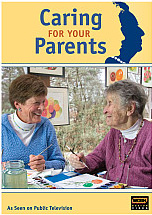Taking Care of Parents
How to Tell Dad He Needs Help
Gretchen Heuring | ElderThink | 04.10.09
There are difficult conversations ahead between us and our aging parents. No matter how close we live or how far, just the thought of these "talks" is stressful. They involve such things as losing the ability to drive, loss of hearing, and moving to assisted living.
We take care of our loved ones in so many ways. Twenty-six million Americans are providing home care for parents. Many of these are also caring for their children, and sometimes their grandchildren. In addition to these caregivers, there are many of us who care for relatives in assisted living communities, visiting often, sometimes every day.
All too frequently, our care is long distance. We have jobs and spouses and children in one city and our dear older people live somewhere else. We care for them primarily by phone and visit as often as possible.
Rehearse the Conversation
Almost always these conversations lead to loss for the older parent. For him (or her) loss of independence and self worth is on the way. The most common reaction is a stubborn refusal to pay attention.
For us, the stakes are high and the time is short. Pushing, insisting or scolding will most likely have no effect. A little practice before the conversation can save time and energy. If you have another trusted adult or teenager who can practice with you, it will help but you can also follow this exercise alone.
You Need Two Kitchen Chairs
Place two chairs so they are facing each other and sit in one. The other chair will hold your imaginary older parent. Tell him what it is that worries you. For example, tell him he can't drive his car any more, or needs help taking care of himself.
Now sit in the other chair. Pretend someone has just said this to you. You will see that you need to prepare a more complicated script.
A three-part plan will be easiest to remember and deliver. It's valuable to allow this conversation to take some time.
Part 1: Say something loving and sympathetic. "You had a bad experience the other day, and I'm worried about you." Now SUAL (Shut up and listen) Maybe pat his arm. Touch is good.
Part 2: Be direct and honest. "I'm going to level with you, and this is going to hurt." (Pause, wait for acknowledgement and maybe a comment) "You will have to give up driving." Now SUAL again. (Don't say a word)
You may get an unpleasant reaction here but sit patiently and wait. This person is giving up a lifetime of independence. When things are calm, go to the last part.
Part 3: Be kind and supportive. "Let's make a plan together. What do you think the first step should be?" Now you give back some control and strengthen your bond with one another.
With practice, you will identify most of the possible obstacles and the conversation will be easier. More important, during this process you are being the best you can be. This is what your parent would want from you, and you will draw the best from him.



